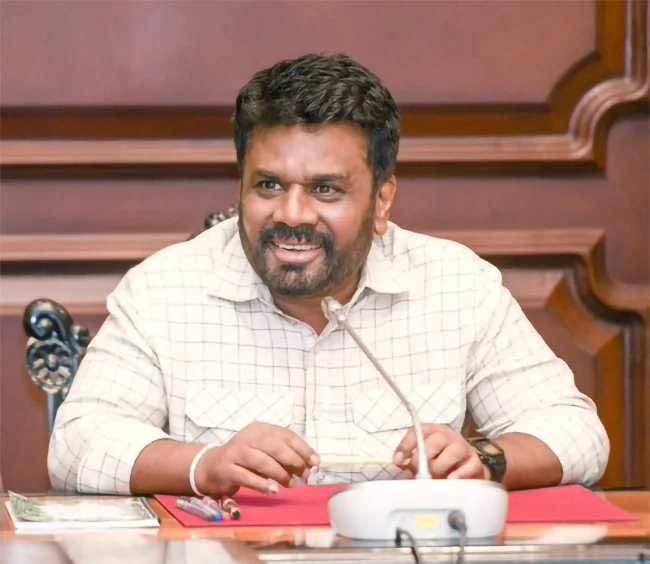President announces how JJB govt lowered IMF benchmarks for benefit of people

President Anura Kumara Dissanayake
By Sanath Nanayakkare
President Anura Kumara Dissanayake speaking in parliament yesterday listed the achievements his government made in bringing tax relief to certain sections of the society during the 3rd review of the IMF, under its Extended Fund Faculty programme.
He also said that the JJB government would leave no room for an economic crisis to take place under its watch.
“Some sections are making attempts to fuel fear among the people that an economic crisis would emerge in 2028 when the country starts repaying its loans, plunging the country back into bankruptcy. Keep in mind that our government will be in office in 2028. We will not allow an economic crisis to happen in the future like in 2022, 2023. Our goal is to build reserves up to USD 15.1 billion by 2028. We are working towards it. We have a strong belief that we will have collected USD billion 15.1 billion in foreign reserves by that time.
“Today, USD 12.55 billion is subjected to debt restructuring plus the shirked payment of USD 1.7 billion. We have restructured USD 12.55 billion out of which USD 11.55 billion were loans taken between 2015-2019.I think If instructions had been given those days, the crisis wouldn’t have happened. Keep in mind that the instructions came in too late.”
“Soon after the general election, IMF started the 3rd review on Nov. 16. At the 2nd review , there were a number of benchmarks with the previous government. One of the main proposals as per the 2nd review was the rental tax on property which was to be enforced in 2025. A service export tax of 30% had been agreed. It had been agreed to remove the special trade levy in January 2025 and replace it with a value added tax. The same tax code was to be continued with personal income tax. It had been proposed to remove the SVAT by April 2025. SVAT makes it easier for businesspeople to claim refunds on the VAT they pay and support their cashflow. But it had been proposed to remove it.”
“When the 3rd review started, what did we propose? You know that there was a lot of disappointment over PAYE tax. associations of doctors, bank managers, university lecturers had expressed their dismay at PAYE tax.”
“We negotiated with the International Monetary Fund to raise the income tax threshold to 150,000 rupees a month from the current 100,000 rupees. The wages of a person earning 150,000 rupees will be 100 percent free from tax. The 6 percent tax on the first slab of 500,000 rupees will be raised to one million rupees. The tax on someone earning 200,000 rupees will be 71 percent free of tax. The salary of a person earning 250,000 will be 61 percent free, 300,000 rupees 47 percent free.Rs 350,000 a month will be free by 25 percent. We have been able to revise PAYE tax to give bigger benefits to lower income earnings and lower benefits to higher income earners.”
“We have agreed to raise the withholding tax on bank deposits to be raised from 5 to 10 percent. However, there will be a process where exemptions can be claimed by senior citizens who think that they shouldn’t be liable to this tax even if they earn a monthly interest of Rs. 150,000. A special division will be set up at the Inland Revenue Department to address such concerns.”
“The value added tax the previous government had imposed on local milk and yoghurt will also be removed, Corporate tax on services export which was to be raised to 30 percent will be reduced to 15 percent, as a result of our negotiations with the IMF,” the President said.
